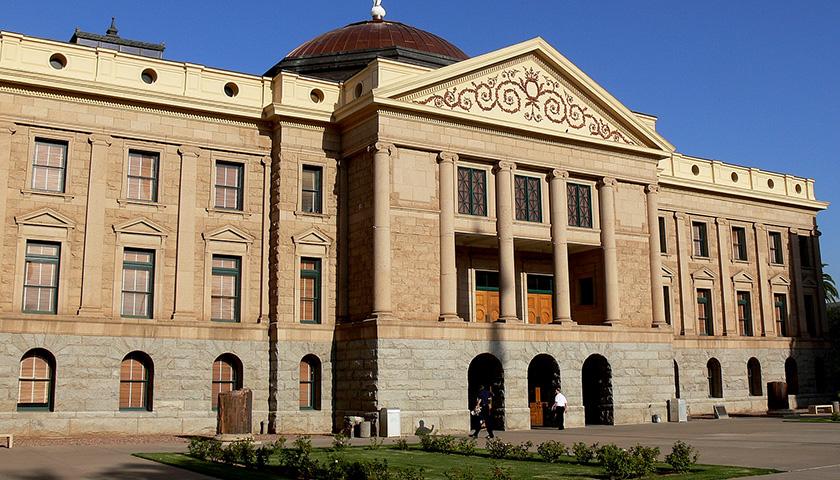by Natalia Mittelstadt
Republican-run Texas and Georgia have given state officials oversight of some local elections following issues in Democratic counties, while Arizona didn’t do so there was a Republican administration.
Last week, the Texas House passed two pieces of election integrity legislation that were previously passed by the state Senate.
One gives the Secretary of State oversight of election officials statewide, and the other that eliminates the Harris County elections administrator position. The latter bill returns the management of elections to an elected county clerk and tax assessor-collector.
Harris County, home to the city of Houston, has vowed to sue over the laws if they are signed by the governor.
The county created the elections administrator office in 2020, which began operations shortly after the November presidential election. Despite spending tens of millions of dollars to overhaul the county’s election system, at least 10,000 ballots weren’t counted in the March 2022 primary election, causing the first administrator to resign.
Under the new administrator, reported irregularities also occurred during the November 2022 general election, such as electronic machines jamming and paper ballots not being delivered to mostly Republican precincts. The Texas Rangers and attorney general’s office are investigating the irregularities.
Harris County also had issues in the 2020 election, causing the Texas secretary of state to conduct an audit, which found the county had “very serious issues in the handling of electronic media.” One of the issues was that at least 14 mobile ballot boxes did not have proper chain of custody records for 184,999 ballots.
Similar to Texas, Georgia has experienced issues with elections in Fulton County, which led the State Election Board to appoint a performance review board to conduct an assessment of the county.
The SEB was able to appoint the board after Georgia enacted an election integrity law that allows the SEB to intervene in county elections, conduct performance reviews of county elections, and remove and replace local election officials.
After conducting a 17-month-long review, the board released its report this January, noting how, despite having issues in the 2020 presidential election, Fulton County has made improvements in the elections since and should continue to do so in preparation for the 2024 presidential election.
“The Fulton County Board of Elections and Registration is engaged and helping to drive those improvements,” according to the report. “Replacing the board would not be helpful and would in fact hinder the ongoing improvements to Fulton County elections.”
Georgia Secretary of State Brad Raffensperger has previously called for Fulton County’s elections to be taken over by the state.
“With SB 202,” the election integrity law passed in 2021, “habitually failing counties can — actually the State Election Board can come in and replace the election director and really take over the governance of that,” Raffensperger told the John Solomon Reports podcast in June 2021, noting Florida took similar action more than 10 years earlier and rectified problems in places like Palm Beach County.
Raffensperger’s election monitor, Carter Jones, found widespread mismanagement and irregularities in Fulton County during the November 2020 elections, including insecure transport of ballots, violations of voter privacy and double scanning of absentee ballots.
Fulton County responded to the performance review board’s January report on Tuesday, saying, “the SEB should decline to remove the Fulton County [Board of Registration and Elections] and should close this matter. There is no reason for the SEB to initiate an additional investigation or to initiate formal removal proceedings.”
Meanwhile, in Arizona, Maricopa County has had at least a decade-long record of election issues, including during the 2020 presidential and 2022 midterm elections.
Following the 2020 presidential election, the Arizona state Senate conducted an audit of the election in Maricopa County, which flagged a large number of voters who potentially voted in the county and at least one other county in the state. It said 5,295 voters cast ballots in Maricopa and at least one other county using “the same first, middle, last name and birth year.”
A separate review of the county’s mail ballots in that election found that more than 200,000 ballots with signatures did not match voter files and were counted without being reviewed.
In the 2022 midterm election, at least 70 vote centers in Maricopa County experienced ballot printer issues on Election Day, which resulted in ballot tabulation machines being unable to tabulate ballots. GOP gubernatorial nominee Kari Lake sued the county over the issues, but that claim was dismissed by the Arizona courts.
There were also difficulties checking voters out so they could cast their ballots at another vote center, and the commingling of non-tabulated ballots in Door 3 of the tabulation machines with tabulated ballots.
While Arizona is currently run by a Democratic administration, following the 2020 election when Republicans still held the governor’s and attorney general’s offices, the state didn’t take over administration of Maricopa County’s elections.
In October 2021, then-Arizona Senate President Karen Fann had threatened that the state may step in to assume direct control of election administration like Georgia. She suggested that the state legislature might consider such an option.
“And what Georgia is doing might be a real good option,” Fann told the John Solomon Reports at the time, saying, “if we find that you are breaking the laws, and you can’t do the election yourself, then maybe the state ought to step in and do it, then. Maybe that’s the penalty.”
However, Maricopa County’s elections were never taken over by the state. While the Arizona legislature is Republican, the current governor, Katie Hobbs, is a Democrat who served previously as Secretary of State through 2022.
Maricopa County, the largest county in the state, had election issues in 2022 while being run by Republican election officials. The county recorder started a political action committee in 2021 that was funded by Democrats and supports Republican candidates who “acknowledge the validity of the 2020 election and condemn the events of January 6, 2021 as a terrible result of the lies told about the November election,” according to a press statement announcing the PAC’s creation.
– – –
Natalia Mittelstadt graduated from Regent University with Bachelor of Arts degrees in Communication Studies and Government.
Photo “Election Day 2022” by Phil Roeder. CC BY 2.0.





